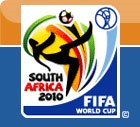All had had a good time
Last week I chatted to a veteran British sports journalist here in SA to cover the tournament and he told me that he was struck by how positive South Africans were about their country while the Saffers he'd encountered in the UK were bitter and negative. Of the British media mob, he was of the general opinion that many would have preferred to have been in a country such as Germany sans the shanty towns and dodgy taxis but all had had a good time.
He was also surprised to come across so many Latin Americans - particularly Argentineans - at this world cup. To a man, he said, they thought South Africa was the bee's knees.
At the start of the world cup I wrote about how the world's media perceived us, concluding that they viewed us a fun,friendly, fractious, interesting nation. And I'm sticking to this now that the tournament is nearly at its end, the Sunday Mirrorstorm in a teacup aside.
Blandly negative
On the one hand, there has been the blandly negative, of course, such as New Zealand Herald reporter Chris Rattue who called Joburg a "hellhole" and a "dangerous dump". The Daily Show's tongue-in-cheek take on the startling lack of racism in today's South Africa is a laugh but the more thoughtful hacks looked beyond the party on and off field and used the world cup as a foil for the real problems that exist here. An obvious theme to focus on was xenophobia and The Guardian of London did a very good video package on this.
On the other hand, Boris Johnson, the mayor of London, wrote in the Daily Telegraph (and reproduced in the SA Sunday Times this weekend) that "the World Cup has given this country something intangible but priceless: a deep sense of pride that it has taken on something difficult and done it well... When they look at themselves in the approving mirror of world opinion, South Africans of every race agree that the first African World Cup is a joyous success, and that success breeds confidence."
Very keen observations
Across the world's media, I also came across these very keen observations of our country - insights that are probably easier for outsiders than ourselves to make. For instance, The New York Times wrote:
"The stadiums got finished, the airports, the roads, things worked on the whole. Violence took a breather. South Africans came together, leaving the question that Mohale Ralebitso, a banker, put to me this way: 'Can we inhabit this space of unity rather than just visit it?' I don't know. I do know the naysayers overlooked something invisible, race-blind South African spirit. I also know we're much better at covering conflict than community, and borders than their banishment on Facebook."
The Age of Australia captured middle-class - and white South Africans' fears - in this article that mused: "The detail of the warm hearth and hearts is important. These were people who have kept faith with the new South Africa, people with fourth and fifth-generation roots here, people who have watched friends leave but have themselves chosen to stay; people whose faith is sometimes sorely tested. Just that week, one's teenage son and a mate had been held up a gunpoint in a taxi, surrendered their money and mobile phones and escaped only because one, rugby-trained, was able to burst open a door. It is not an easy country in which to be a child. It is not an easy country in which to be a parent."
Makes it interesting
Just because The Age article explores the problems of our country doesn't mean it's negative. In fact it makes it interesting, which quite frankly is the best anyone can ask for. And SA is interesting, socially, politically and economically.
The Financial Times said in this article that it was generally agreed that the world cup was a triumph and that real progress from the heyday of apartheid was evident. The paper also said:
"When it came to the World Cup, the government got its act together, partly because it was put under huge external pressure... At home, however, the African National Congress faces no similar external pressure. As the party of liberation, it seems justifiably confident that it will keep winning elections long into the future.
"One-party rule need not always lead to disaster. In Singapore and China, well-entrenched ruling parties have managed to preside over long-periods of rapid economic growth. The trouble is that the ANC seems to be well to the left of the Chinese Communist party. It has saddled South Africa with regulations and labour-laws that would be more appropriate to Sweden than to a developing nation. While China bent over backwards to attract foreign investors, South Africa has adopted investment laws that impose heavy costs on investors in the name of 'black economic empowerment'. That seems to have enriched a small group of well-connected black insiders, while discouraging job creation for the poor. Many South Africans, black and white, complain that their government is increasingly complacent, corrupt and inefficient... It would be wonderful if the South African government can now prove that it can tackle crime, transport and all of the country's many other problems - not just for a month and not just for foreigners - but long into the future and for all South Africans."
How very interesting.
Come back soon
Personally, I will be quite sad to see the world cup end. The festive atmosphere, the flags, the fans, the foreign journalists - it's been so much fun. We've also so enjoyed having the world over to our place. The conversation has been fascinating. You've given us lots to think about. Come back soon.
For more:


































